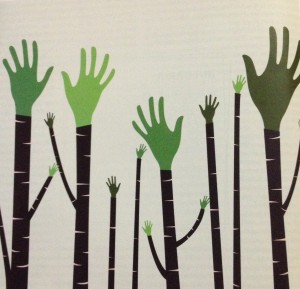The essential message of these three very different movies–all playing now–is that everything is up to us.
Interstellar and Birdman are rivals on the twinned theme of love and passion. Where they diverge is that Birdman establishes no context: there’s only the stage awhirl in the midst of contemporary chaos. Interstellar, according to the best principles of science fiction, embeds its story in the established science of our times, prioritizing the climate crisis on the scale at which it deserves, within the irrefutable consequences of species survival or extinction. Along comes Dear White People, to illustrate the sickening scope of intraspecies bigotry and pettiness which we’ve yet to overcome.
While watching Interstellar, I wondered at the non-representative racial composition of the slice of surviving humanity the film constructs for us to see. Tokenism reigns, unless Christopher Nolan and his band of writers aim to propose that the privileges of whiteness extend into the near-term upcoming calamity. They could, of course. Certainly the U.S. government is embattled on this linch pin: will democracy, freedom, and equality of opportunity truly be enabled for all or will special [white] interests continue to dictate law and privilege? Not that underfunded NASA seems likely to have anything to offer in the way of off-planet redemption. That’s more likely to come from the European Space Agency, having successfully landed a spacecraft on a streaking comet.
As far as media effects go (that is, convincing the world that white people, especially white men, are the main strain of the species worth caring about), Birdman is right on cue, with its agonized and agonizing straight white male Everyman. Saving Broadway! Hallelujah!
While Birdman patches together an impressively tight composition of literary layers and cultural references, Dear White People blows it out of the water with the most densely packed social commentary I’ve ever seen. (Curious to know what you think are its equals, or even in the same league.)
“Dear White People,” Samantha White (Tessa Thompson) sums it all up, “Nevermind.” Are the costs of racial fallout still too touchy to resolve? In our day and age, too many white people are playing racism as a game–and a fun one at that. People of color are still too often forced to craft lives within the omnipresence of race consciousness. (It’s time to be colorbrave.) Oh sure, Dear White People is a comedy! How else could such stunning criticism receive the light of day? Are all the characters types? Aren’t we all, each of us, out here living our real, untheatrical lives, also easily categorized as a type? The question is which types get airtime and which don’t; which types can help us reweave the social fabric and which won’t. We have to choose.
“Humans are cultural animals,” writes Mark Morey. “Our evolution continues along paths that we direct through our choices, patterns, and behaviors. Even more importantly—we pass culture along through initiation and story.” The story of Interstellar is that the bond of parents and children is a force commensurate with gravity. The science stretches into fiction here, because none of the things we need to know to pull off such a journey are within reach. The declining ability to grow food, however, foretells the end of humanity in Interstellar much as it does in actual climate science. Food doesn’t enter Birdman, and is only racialized in Dear White People. Now, stretch with me, will you?
Just as Lionel blows when his jazz solo arrives—even though he doesn’t like jazz!—we need to be colorbrave in our daily lives, identify and dismiss noisome distractions, and alter the impelling rush of catastrophe. Somehow, someway, the artistic and intellectual brilliance of today’s intergenerational collective intelligence must form new relationships and stories that recreate and renew society based on perennial agriculture, aka permaculture. The trio of films examined here demonstrate that social justice needs permaculture and vice-versa, if another seven generations are to prosper on the earth.
View all posts in series Learning Resiliency
Previous in Series: Interpreting — Next in Series: Imitation: Not only a game







